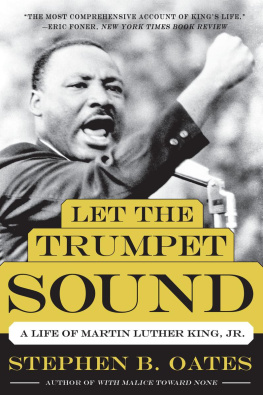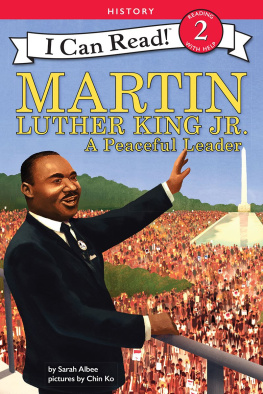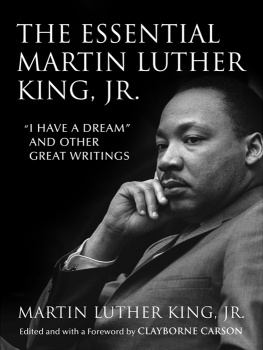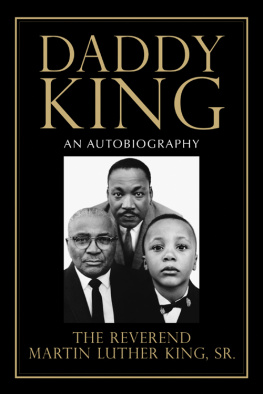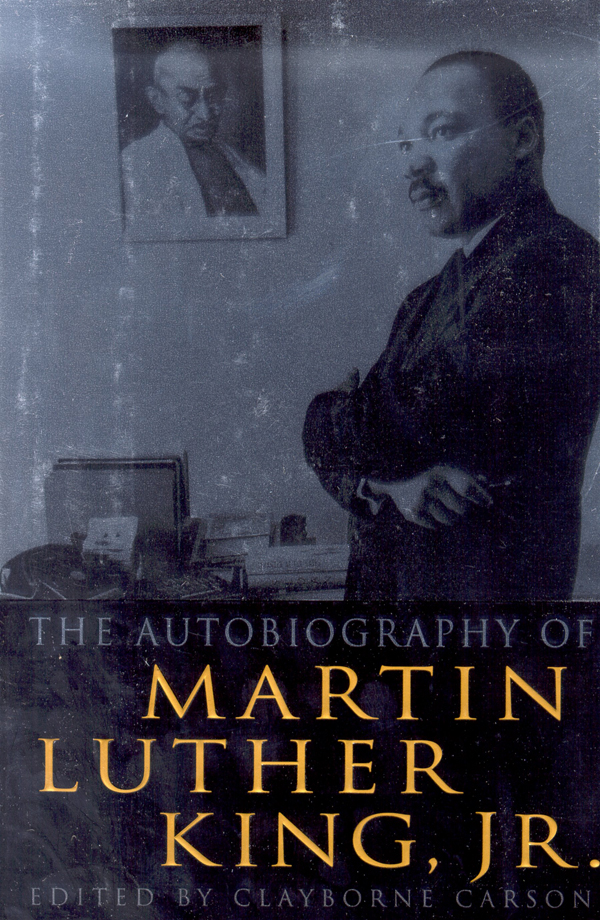In accordance with the U.S. Copyright Act of 1976, the scanning, uploading, and electronic sharing of any part of this book without the permission of the publisher constitute unlawful piracy and theft of the authors intellectual property. If you would like to use material from the book (other than for review purposes), prior written permission must be obtained by contacting the publisher at permissions@hbgusa.com. Thank you for your support of the authors rights.
Copyright 1998 by The Heirs to the Estate of Martin Luther King, Jr.
All rights reserved. In accordance with the U.S. Copyright Act of 1976, the scanning, uploading, and electronic sharing of any part of this book without the permission of the publisher constitute unlawful piracy and theft of the authors intellectual property. If you would like to use material from the book (other than for review purposes), prior written permission must be obtained by contacting the publisher at permissions@hbgusa.com. Thank you for your support of the authors rights.
Grand Central Publishing
Hachette Book Group
237 Park Avenue, New York, NY 10017
www.hachettebookgroup.com
www.twitter.com/grandcentralpub
Second e-book edition: January 2001
Grand Central Publishing is a division of Hachette Book Group, Inc.
The Grand Central Publishing name and logo is a trademark of Hachette Book Group, Inc.
The publisher is not responsible for websites (or their content) that are not owned by the publisher.
The Hachette Speakers Bureau provides a wide range of authors for speaking events. To find out more, go to www.hachettespeakersbureau.com or call (866) 376-6591.
ISBN 978-0-759-52037-0
It gives me great pleasure to finally see my husbands words in autobiographical form. During the Civil Rights Movement a number of publishers and news organizations showed remarkable courage in bringing Martins views to the public. Without these media outlets, the bits and pieces of which this autobiography is made would have been lost to posterity. Hence, my gratitude goes to HarperCollins, William Morrow, Pocket Books, Henry Holt, Pitman, University of California Press, Harper & Row, Random House, New American Library, Kennedy Presidential Library, Albany Herald, Atlanta Journal, Christian Century, Ebony, Hindustan Times, Jet, Look, Massachusetts Review, McCalls, Montgomery Adviser, Nashville Tennessean, The Nation, New York Amsterdam News, New York Post, New York Times, Playboy, Progressive, Redbook, Saturday Review, Southern Courier, TIME, ABC, BBC, CBC, The Merv Griffin Show, NBC, and WAII-TV, as well as others too numerous to mention.
Intellectual Properties Management (IPM) has made extensive efforts to identify the original source of all the material that appears in this autobiography, and to seek appropriate permission. But as with any endeavor, errors can take place. If an oversight is noted, please contact IPM so that proper credit can be made in future editions.
Coretta Scott King, September 1998
Highest recommendation compelling Carson creates an eloquent and expressive narrative [and] lets MLKs distinct first-person perspective resonate through the book.
Library Journal
A stunning re-creation, persuasive in the feeling of its authenticity Carson succeeds admirably. Reveals the humanity of a man who is now almost an icon.
Seattle Times & Post-Intelligencer
A fascinating, often insightful look at one of the greatest Americans. Carson [provides] a full treatment of Kings emergence as a national figure [and gives] a useful overview of his life and achievements.
Milwaukee Journal Sentinel
Remarkable Dr. King speaks eloquently and powerfully through these pages and affords readers a privileged look into his mind and heart. Read this book. If it does nothing else, it will remind you of a voice we sorely miss.
America
A fascinating look into the mind of one of our nations great heroes.
Chattanooga Times
Carson [brings] life to Kings words and does justice to the leaders legacy.
Tulsa World
Enjoyable educational.
Tampa Tribune-Times
Carson has an in-depth knowledge and understanding of King that is brought to bear in this work.
Gospel Today
This work is compelling. What emerges is a life lived with courage and conviction.
Kirkus Reviews
Carson captures Kingin his own words and thoughtsabout some of the most trying times of black life in America.
Indiana Herald
An impressive work. Carson rewards us with an absorbing trip through the mind of the twentieth centurys most significant articulator of civil rights.
Crisis

I first saw Martin Luther King, Jr., from a distance. He was up on the platform in front of the Lincoln Memorial, the concluding speaker at the 1963 March on Washington for Jobs and Freedom. I was below in the vast crowd of listeners around the reflecting pool, a nineteen-year-old college student attending my first civil rights demonstration. He would become a Man of the Year, a Nobel Prize laureate, and a national icon. I would become a foot soldier in the movement he symbolized and would walk through doors of opportunity made possible by that movement.
More than two decades later, after I became a historian at Stanford University, Mrs. Coretta Scott King unexpectedly called me to offer the opportunity to edit the papers of her late husband. Since accepting her offer to become director of the King Papers Project, I have immersed myself in the documents recording his life and have gradually come to know a man I never met. The study of King has become the central focus of my scholarly life, and this project is the culmination of my career as a documentary editor. The March on Washington started me on the path to The Autobiography of Martin Luther King, Jr. This book is a product of Kings intellectual legacy, just as I am a beneficiary of his social justice legacy.
The following narrative of Kings life is based entirely on his own words. These are his thoughts about the events in his life as he expressed them at different times in various ways. Although he never wrote a comprehensive autobiography, King published three major books as well as numerous articles and essays focusing on specific periods of his life. In addition, many of his speeches, sermons, letters, and unpublished manuscripts provide revealing information. Taken together, these materials provide the basis for this approximation of the autobiography that King might have written had his life not suddenly ended.
For the most part, this book consists of autobiographical writings that were published during Kings lifetime and were personally edited by him. In many instances King was assisted by others, since he made considerable use of collaborators. Nevertheless, Kings papers provide ample evidence of his active involvement in the editorial processes that resulted in his most significant publications. Indeed, the preparation for this autobiography involved examining preliminary drafts (several handwritten) of Kings published writings in order to determine his intentions. I have included passages from such drafts when they contain revealing or clarifying information that does not appear in the published version.
Although Kings published autobiographical writings provide the basic structure of this book, they constitute an incomplete narrative. In order to fill out the narrative and to include Kings accounts of events that are not discussed in his published writings, I have incorporated passages from hundreds of documents and recordings, including many statements that were not intended for publication or even intended as autobiography. These passages augment the published accounts and serve as transitions between more extended narratives. In some instances, I have made editorial changes, which are explained below, in order to construct a narrative that is readable and comprehensible. This exercise of editorial craft is intended to provide readers with a readily accessible assemblage of Kings writings and recorded statements that would otherwise be available only to a handful of King scholars.


